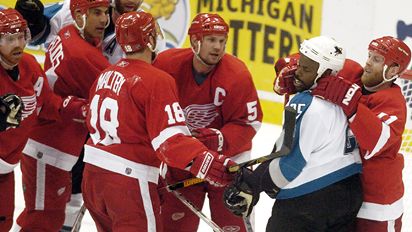 Every year, the MLB All-Star game promises us at least 9 innings of half-assed baseball, which usually feature an American League team comprised entirely of Yankees, Red Sox, and Angels starters. So much for variety--and that's even before five Cardinals take the field for the National League.
Every year, the MLB All-Star game promises us at least 9 innings of half-assed baseball, which usually feature an American League team comprised entirely of Yankees, Red Sox, and Angels starters. So much for variety--and that's even before five Cardinals take the field for the National League.The consequences of this trend are dire. Mark Loretta has started an All-Star game (as a member of the Red Sox). So has Shea Hillenbrand (ditto). And, horror of horrors, so has David Eckstein (the Cardinals Effect).
This is to be expected, as fan voting for All-Star starters is nothing but one big fat popularity contest that the biggest and most visible franchises almost always win. Obviously, this is not a new insight, nor is it endemic to professional baseball. What I have noticed, though, is that the vast majority of the All-Star electorate doesn't really care about mediocre performance as long as they see a name they have heard before. Sport imitates life.
I pondered this as I watched the Phillies-Cubs game last night, flossing my Ryan Howard jersey (even though he didn't play), watching Chase Utley get plunked for the twelfth time, and clutching the All-Star ballot given to me by the overly suspicious corps of Phillies ushers. I thought about voting for the players that contribute the most to their team, regardless of their public stature. This is my usual custom.
But then I noticed that every single (projected) starter for every single major league club gets put on the ballot, and that's when I decided that the entire voting process is a cruel tease for the 85% of players who won't make the All-Star team. How do you think the fat kid with psoriasis feels when he sees the "Most Huggable" category in the senior poll? He knows he isn't getting any votes--at least not serious ones.
If performance doesn't seem to matter anyway, can't we try to make some poor schlub's career a bit more memorable? Consider this an appeal for an "All-Dilution" team: guys that have a starting job on a major league ballclub partially because their bodies were warm and, well, the Nationals have to put somebody at second base and center field.
Come on. Punch the chad for the yeomans of our national pastime. Do it for Ronnie Belliard. Do it for Mike Bordick. Do it for Junior Spivey, Ken Harvey, and Phil Nevin--each one adequate at best. And each one an All-Star.
The Baker Bowl's 2007 All-Misfit All-Stars:
(as found on this year's ballot; chosen regardless of current injury and on a basis of minimum 4 years of MLB service, no All-Star selections, and general mediocrity)
American League
1B: Ty Wigginton, Tampa Bay
2B: Mark Ellis, Oakland
SS: Juan Uribe, Chicago
3B: Nick Punto, Minnesota
C: Gregg Zaun, Toronto
OF: Emil Brown, Kansas City; Jay Gibbons, Baltimore; Craig Monroe, Detroit
National League
1B: Scott Hatteberg, Cincinnati
2B: Adam Kennedy, St. Louis
SS: Adam Everett, Houston
3B: Pedro Feliz, San Francisco
C: Miguel Olivo, Florida
OF: Xavier Nady, Pittsburgh; Terrmel Sledge, San Diego; Nook Logan, Washington


